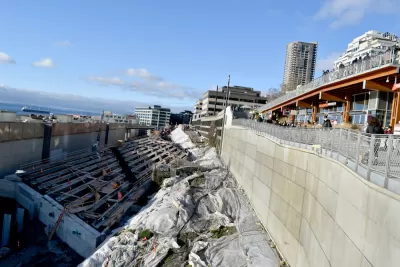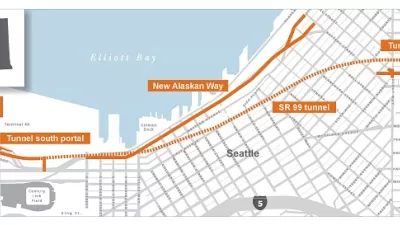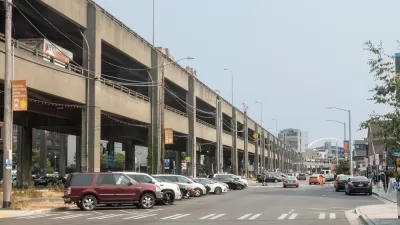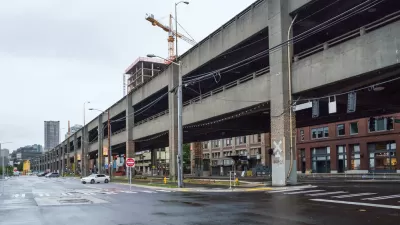Public transit isn't the only mode struggling to attract the expected number of users in 2022. State Route 99 in Downtown Seattle is also failing to live up to expectations and struggling to make ends meet.

Recent revenue forecasts for the State Route 99 tunnel underneath downtown Seattle—built to replace the demolished Alaskan Way Viaduct—paints a dire picture for the costly and controversial project.
Long-time Planetizen readers will recall the saga of the SR 99 tunnel—the project that trapped a tunnel boring machine known as Bertha under the city on more than one occasion between 2013 and 2016, delaying and driving up costs for a project that many advocates said was unnecessary to replace the capacity of the Alaskan Way Viaduct, which has since been completely demolished.
The Washington State Department of Transportation built the tunnel, and now it seems drivers aren’t actually paying the toll to use it enough to cover the costs of operating and maintaining the tunnel. As Ryan Packer reports for the Urbanist, the latest revenue forecast provided by the state treasurer’s office expects a permanent decline in revenue from tools from somewhere between 16% to 30%.
“I think it’s important to note that there’s been a permanent shift in the projected use of this corridor, which is going to have a pretty substantial negative impact on our revenues over the projection period,” says Jason Richter, the state’s deputy treasurer for debt management, as quoted in the article. Richter provided the Washington Transportation Commission
With “a balance sheet that by 2052 showed a cumulative negative balance of $236 million dollars,” reports Packer.
“Overall traffic volumes in the SR 99 tunnel are not looking good compared to the forecasts that WSDOT prepared over a decade ago as part of the environmental review for the Alaskan Way Viaduct replacement program. That documentation projected that with tolling in place, by 2030 over 57,000 vehicles per day would use the facility, a substantial decline compared to the number that would use it if it weren’t tolled,” explains Packer. Traffic volumes are currently well below 40,000 vehicles a day, adds Packer.
Other highways in the state’s system are back to pre-pandemic flows, so the SR 99 tunnel is likely a victim of the same economic and demographic trends currently gutting transit ridership and office occupancy rates in downtowns around the country.
FULL STORY: SR 99 Tunnel is Bleeding Money as Toll Revenue Forecasts Plunge

Planetizen Federal Action Tracker
A weekly monitor of how Trump’s orders and actions are impacting planners and planning in America.

Maui's Vacation Rental Debate Turns Ugly
Verbal attacks, misinformation campaigns and fistfights plague a high-stakes debate to convert thousands of vacation rentals into long-term housing.

Restaurant Patios Were a Pandemic Win — Why Were They so Hard to Keep?
Social distancing requirements and changes in travel patterns prompted cities to pilot new uses for street and sidewalk space. Then it got complicated.

In California Battle of Housing vs. Environment, Housing Just Won
A new state law significantly limits the power of CEQA, an environmental review law that served as a powerful tool for blocking new development.

Boulder Eliminates Parking Minimums Citywide
Officials estimate the cost of building a single underground parking space at up to $100,000.

Orange County, Florida Adopts Largest US “Sprawl Repair” Code
The ‘Orange Code’ seeks to rectify decades of sprawl-inducing, car-oriented development.
Urban Design for Planners 1: Software Tools
This six-course series explores essential urban design concepts using open source software and equips planners with the tools they need to participate fully in the urban design process.
Planning for Universal Design
Learn the tools for implementing Universal Design in planning regulations.
Heyer Gruel & Associates PA
JM Goldson LLC
Custer County Colorado
City of Camden Redevelopment Agency
City of Astoria
Transportation Research & Education Center (TREC) at Portland State University
Jefferson Parish Government
Camden Redevelopment Agency
City of Claremont





























